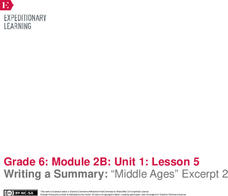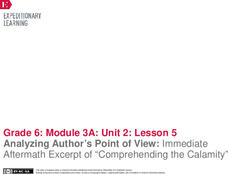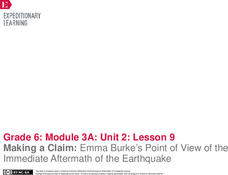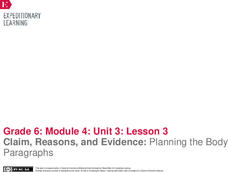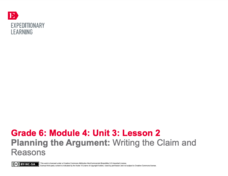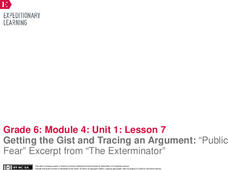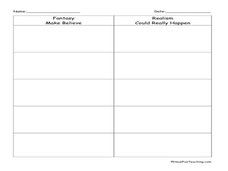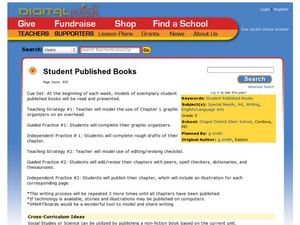Alabama Learning Exchange
The Big Bang Theory: An Evidence-Based Argument
What evidence supports the big bang theory? Individuals analyze scholarly resources about the the theory and develop arguments backed by evidence. They brainstorm, share ideas, watch a video, and read articles to complete a graphic...
EngageNY
Reading Proficiently and Independently: The Power of Setting Goals
Scholars reflect upon their reading strengths and challenges to create personal reading goals. Participants use goal-setting verbiage in an accordion-style graphic organizer, a first step in writing a letter that details their reading...
Stanford University
Battle of the Somme
The Battle of the Somme was a conflict that raged on for months. Academics view a presentation and read text excerpts from newspaper articles to understand the events that turned the battle into a long conflict. The presentation also...
EngageNY
Writing a Summary: “Middle Ages” Excerpt 2
What is the big idea? Scholars use Middle Ages Excerpt 2 to complete a summary graphic organizer. They then use the information from the organizer to write a summary of the text on lined paper. Learners share summaries with the class.
EngageNY
Analyzing Author’s Point of View: Immediate Aftermath Excerpt of “Comprehending the Calamity"
Analyze that! Scholars continue reading and analyzing a primary source about the immediate aftermath of the 1906 San Francisco fire and earthquake. Then, individuals use graphic organizers to identify the author's point of view.
EngageNY
Reading for Gist and Analyzing Point of View: Moon Shadow
Character analysis isn't always earth-shattering. Using a graphic organizer, pupils analyze Moon Shadow's point of view following the earthquake in Laurence Yep's Dragonwings. Also, scholars co-create an anchor chart showing the...
EngageNY
Making a Claim: Emma Burke’s Point of View of the Immediate Aftermath of the Earthquake
Sharpen those pencils; it's time to write! Scholars begin writing the first body paragraph of their literary analysis essays. Additionally, pupils use graphic organizers to analyze a character's point of view from Laurence Yep's...
EngageNY
Claim, Reasons, and Evidence: Planning the Body Paragraphs
Planning is the key to success. Scholars continue planning their essays by adding reasons to their Planning My Argument graphic organizers. Additionally, pupils analyze a body paragraph from a model position paper, identifying the...
EngageNY
Planning the Argument: Writing the Claim and Reasons
Step up! Using the resource, scholars discover the six steps to writing an effective position paper. Next, they work on a graphic organizer to begin planning their argument-based essays.
EngageNY
Getting the Gist and Tracing an Argument: “Public Fear” Excerpt from “The Exterminator”
Only fear fear itself. Scholars read Public Fear from The Exterminator. Triads work together to annotate and determine the gist of the text. They then complete a Tracing an Argument graphic organizer to identify arguments, claims, and...
EngageNY
Annotating the Text and Identifying Argument, Claims, and Evidence: “Double Whammy” Excerpt from “The Exterminator"
That's a double whammy! Scholars read the excerpt Double Whammy from The Exterminator. After identifying the gist of the text, they annotate by marking the author's claim. The group discusses what is meant by double whammy and complete...
EngageNY
Tracing a Speaker’s Argument: John Stossel DDT Video
Which side are you on? Scholars watch a video of John Stossel discussing the use of DDT pesticide. Learners talk about the purpose of the video and the speaker's argument and then complete a Tracing an Argument graphic organizer while...
EngageNY
Comparing an Author’s Presentation of Ideas: “Rachel Carson: Sounding the Alarm on Pollution”
It's all in the presentation. Readers take a look at author's presentation in the article Rachel Carson: Sounding the Alarm on Pollution. Scholars work together to complete a Comparing
and Contrasting Authors’ Presentation graphic...
EngageNY
End of Unit Assessment, Part 1: On-Demand Essay “What Makes A Hurricane A Natural Disaster?”
It's time to refine writing and word choice. Learners work on Part 1 of their end of unit assessment by creating an essay titled What Makes a Hurricane a Natural Disaster? They use glossaries and graphic organizers from previous lessons...
Overcoming Obstacles
Resolving Conflicts
The final lesson in the Resolving Conflicts module asks participants to summarize what they have learned about resolving conflicts. Groups then apply what they learned to a conflict described in a provided scenario.
Curated OER
Tour + Workshop = DESIGN: Presenting Information
Students develop a business card to market them. In this developing a business card to market them lesson, students design a business card to represent them. Students create a logo or graphic design that is professional and catchy. ...
Curated OER
Fantasy or Realism? Graphic Organizer
In this fantasy/reality worksheet, students complete a graphic organizer, filling in columns labeled "make believe," and "could really happen." Worksheet is a blank template.
Curated OER
Inference Lesson Plan
Students practice assessing graphics to infer and identify an author's implicit and explicit meaning in a piece of text. They evaluate the effectiveness of information found in maps, charts, tables, graphs, diagrams, cutaways and through...
Curated OER
Five Parts That Contribute to the Whole
Students listen to and read an online story. Then they use a graphic organizer to learn the basic story elements. They select another online story and create a graphic organizer for its story elements.
Curated OER
Learning New Definitions
Students are introduced to new vocabulary. Then they are to guess what the words mean without using a dictionary. They organize words into a graphic organizer.
Curated OER
What is Manga?
Students research graphic novels. In this manga lesson, students work in small groups as the read graphic novels in literature circle format.
Curated OER
Student Published Books
Fifth graders create a graphic organizer after it is modeled by the teacher. In this graphic organizer instructional activity, 5th graders complete a graphic organizer describing chapter 1 of a book. Graphic organizers will be revised...
Curated OER
Use Microsoft Word to Create a Flyer
Students use a word processing program to create a flyer for an upcoming event at the school. They design the flyer using different fonts, font sizes, and graphics.
Curated OER
Creating Your Own Ad
Students analyze the effective advertisements in print and Internet ads. In this advertisements lesson, students create a collage of original and repurposed words, graphics, and images of advertisements. Students create a poster for the...
Other popular searches
- Graphic Organizers
- Graphic Design
- Biography Graphic Organizer
- Main Idea Graphic Organizers
- Vocabulary Graphic Organizer
- Story Map Graphic Organizer
- Graphic Aids
- Science Graphic Organizers
- Setting Graphic Organizer
- Math Graphic Organizers
- 4 Square Graphic Organizer
- Sample Graphic Organizers





